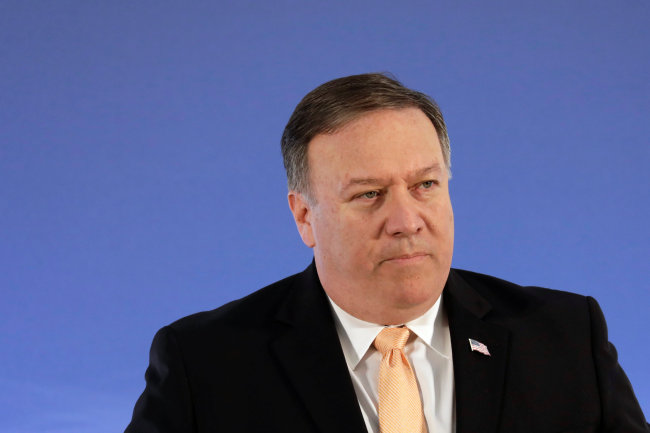With US Secretary of State Mike Pompeo heading to Pyongyang to meet with North Korean leader Kim Jong-un, how much progress they can make on denuclearization remains the most pressing question amid persistent doubts over Kim’s pledge to completely abandon the country’s nuclear program.
Pompeo was set to arrive in Pyongyang on Friday and continue ongoing denuclearization negotiations with North Korea. It is Pompeo’s third known trip to North Korea and the first one since last month’s US-North Korea summit in Singapore.
But challenges loom large for the top US diplomat following a series of reports questioning North Korea’s denuclearization pledge, with experts suggesting that the meeting could end without a specific roadmap for the denuclearization process.
“The best possible outcome is to have North Korea commit to verification of its nuclear program. But I don’t think there will be a detailed timeline for inspecting North Korea’s nuclear arsenal,” said Ko Myung-hyun, a research fellow at the Asan Institute for Policy Studies.
“They might agree on returning US war remains or even dismantling a missile engine test site. However, without a detailed road map for the verification process, we cannot say for certain that North Korea is really committed to completely abandoning its nuclear program,” he added.

US Secretary of State Mike Pompeo. Yonhap
Pompeo told CNN last week he would not put a timeline on negotiations regarding North Korea’s denuclearization, though national security adviser John Bolton later said that the US has a plan to dismantle North Korea’s nuclear program within a year.
Asked about Bolton’s remark about dismantling “the overwhelming bulk” of weapons of mass destruction and ballistic missile programs, White House spokesperson Sara Sanders said if North Korea makes the decision to denuclearize, its ballistic programs could be dismantled in a year.
While it is unlikely that Pompeo and Kim would come up with a comprehensive timeline for scrapping every aspect of North Korea’s nuclear program, they could agree on a basic verification process for nuclear weapons threatening the US mainland, another expert said.
“Establishing a specific timeline for all nuclear facilities and nuclear material might be difficult at the Pompeo-Kim meeting. But they can set up a timeline for dismantling intercontinental missiles,” said Cho Seong-ryoul, a senior researcher at the Institute for National Security Strategy
Pompeo’s trip comes amid growing doubt in Washington over Pyongyang’s sincerity toward denuclearization, with intelligence assessment and satellite imagery suggesting that North Korea is expanding its nuclear and missile capabilities at secret sites.
Citing a group of anonymous US intelligence officials, NBC News reported last week that North Korea has increased production of fuel for nuclear weapons at multiple secret facilities in recent months.
According to the Washington Post, US intelligence officials have concluded that North Korea does not intend to fully surrender its nuclear stockpile and instead is considering ways to conceal the number of weapons it has and the secret production facilities.
“While North Korea won’t leave the negotiation table by taking issue with the US reports, they would put significant pressure on North Korea,” said Ko of Asan Institute. “It’s like sending a strong signal to North Korea that ‘we know everything you did, don’t ever try to fool us.’”
Such assessment – if proven accurate – reflects the challenges that lie ahead for the arduous process of complete denuclearization of North Korea, a process that experts said should include thorough declaration and verification of nuclear weapon and facilities.
Nuclear scientists here said that although North Korea could technically abandon its nuclear program within a year -- as Bolton has suggested -- complete inspection of full disarmament is unlikely to be achieved in the proposed time frame.
“If we are just talking about removing nuclear warheads and material from North Korea, it can be achieved within a year, though the process can take more than that if chemical, biological weapons are included,” said Ahn Jin-soo, a former senior researcher at Korea Institute of Nuclear Nonproliferation and Control.
“Difficulties could arise during negotiations over the verification process as it is more about political discussion between the two Koreas. It would take a much longer time to figure out what they are willing to exchange with each other,” he added.
By Yeo Jun-suk (
jasonyeo@heraldcorp.com)

![[Exclusive] Korean military set to ban iPhones over 'security' concerns](http://res.heraldm.com/phpwas/restmb_idxmake.php?idx=645&simg=/content/image/2024/04/23/20240423050599_0.jpg&u=20240423183955)

![[Graphic News] 77% of young Koreans still financially dependent](http://res.heraldm.com/phpwas/restmb_idxmake.php?idx=645&simg=/content/image/2024/04/22/20240422050762_0.gif&u=)


